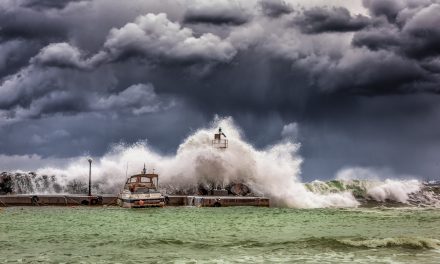Education Will Never Be the Same Again
Thou shalt be an original, a one-off, and cultivate one-off originals. | by Leonard Sweet
[Children] should be taught not the little virtues but the great ones.
Not thrift but generosity and an indifference to money; not caution but courage and a contempt for danger; nor shrewdness but frankness and a love of truth; not tact but love for one’s neighbour and self-denial; not a desire for success but a desire to be and to know.
NATALIA GINZBURG,
THE LITTLE VIRTUES
Higher education today is poised right where the Roman Catholic church was on the eve of the Reformation, where the British Empire was on the eve of the American Revolution, and where Humpty Dumpty was on the wall just before his great fall: elitist and removed from the hoi polloi and the future in a culture that values equality above elitism.
Two-thirds of US students start some sort of tertiary education after high school, choosing from some four thousand institutions of higher education. Both numbers will only drop precipitously, partly because the digital revolution and financial realities no longer require the leave-home rite of passage to become a “wandering scholar.”
Factory-model, industrial-style, fill-in-the-blanks learning has never been replaced by models of learning that fuel and fill up the mind and enchant the human spirit. VR (virtual reality) has not lived up to its promise of transforming education. But it will.
The proof is in the pudding. The words rich and well educated no longer go together, as Vietnam, one of the poorest countries in the world, does better than the US in math, science, and reading. The 10 percent of Vietnamese kids who are most disadvantaged do better than the average US American child on tests in these three subjects.1
Open a school, close a prison.
ATTRIBUTED TO VICTOR HUGO
Our methods of education are part of our culture and its practices. As cultures shift, methods of education need to adapt or risk becoming irrelevant, uninteresting, and/or ineffective, at least when it comes to engaging and impacting the community at large. If science, music, and other art forms evolve across time and cultures, why not education? When you can spend $180 a year at masterclass.com to get twenty-four sessions on writing with Malcolm Gladwell, or on filmmaking with Martin Scorsese, or jazz with Herbie Hancock, or architecture with Frank Gehry, or the art of performance with Usher, or singing with Christina Aguilera, or cooking with Gordon Ramsay, or writing for television with Shonda Rhimes, how much longer do you think someone will pay $80,000 a year to study at one of our colleges or universities?
Here are some commanding themes that will be key components of any responsible educational models for the remainder of the twenty-first century. In place of “education,” we are calling it “enchantment learning.”
10 Commandments of Enchantment Learning
- Thou shalt have no other subject higher than the student. Corollary: Kill the learning box misnamed “the classroom.”2 The real classroom for learning is the world.
- Thou shalt not make for yourself graven images of any technology, nor bow down to any tablet, whether print or digital, nor worship any culture, whether Gutenberg or Google. Thou shalt learn to speak and communicate in the vernacular of the culture you are in.3
- Thou shalt not take the name of your profession in vain. Corollary: Don’t “teach.” Design and organize learning instead.4
- Thou shalt remember the sandbox, where learning is fun. Keep the playground holy.5
- Honor the Cloud, the gifts of your ancestors, so that you may live long into the future by not confusing relevancy with recency.
- Thou shalt not forget Moore’s law, which is breathing new life, thanks to AI chip making. Half-lives of knowledge are getting shorter and shorter.6
- Thou shalt defy Illich’s law at every opportunity, which predicts that it’s only a matter of time until any bureaucracy will create the very condition it was organized to prevent.
- Thou shalt not commit an MOOC (Massive Open Online Course).7 In the future, students will be allowed to specialize earlier and earlier (like athletes do today). There will be fewer generalized diplomas, only certificates of competencies or credentialing in skills that are required by the marketplace. The name of the education game is individualized, customized, tailored learning experiences. Learning systems must be based on new academic paradigms that shift from passive learning modes to active learning modes, especially ones where students learn habits of mind and habits of the soul at their own rates and in their own areas of special interest.
- Thou shalt not play it safe but instead take risks and dance the failure shuffle. (“Shake the dust off your feet,” said Jesus.8) All learning requires unlearning, which requires tremendous courage.
- Thou shalt not commit a factory-model, cookie-cutter pedagogy. Thou shalt not covet your neighbor’s YouTube, nor his Facebook, nor his Instagram, nor his zip code. Thou shalt be an original, a one-off, and cultivate one-off originals.
Only well-educated and technically competent persons can destroy civilization. . . . Education is not enough. Educated men staffed the atomic plants and designed the Buchenwald furnaces.
JUSTICE ROBERT HOUGHWOUT JACKSON,
CHIEF US PROSECUTOR AT THE NUREMBERG TRIALS
END NOTES
HOT TAKE—PEDAGOGICAL AND ANDROPOLOGICAL REVOLUTIONS
- Chloe Pfeiffer, “Vietnam’s Students Perform Mysteriously Well on Tests, and Researchers Have Figured Out Why,” Business Insider, July 14, 2016.
- You shalt have no other subject higher than the student. You shalt treat students as subjects, not objects— More as apples than oranges: wholes to respect, not assemblages to be taken apart—as whole-brained humans, not left-brained lobes with right-brained lobotomies. When you are educated in parts, is it any wonder that the different parts of our lives do not fit together? Corollary to Commandment 1: Thou shalt kill the industrial “classroom,” where big-jug, little-mug/lecture-drill-test methods of instruction have reigned for far too long. The separation of the learning environment from the living and working environment must be ended. The classroom metaphor carries too much baggage: test anxiety and so on. Delivery mechanisms have become destinations. Thou shalt only conduct “courses,” a journey metaphor: Like a river takes its “course” by meandering and changing direction depending on what it encounters on the journey, so is learning a pilgrimage. The ultimate classroom is the world, the universe, so education in the future will take place not in centralized houses of learning and other formal educational settings, but in decentralized sites and natural Environments where peer-to-peer learning is a primary driver. The student-student relationship is now as important as the teacher-student relationship. Teach the student, not the book. If you end a “course” where the syllabus says you should end, it will have been a “class,” not a “course.” Each student should shape the direction of the “course.” Likewise, the concept of a “major” is outdated for a liberal arts education. The question is not “What’s your major?” but “What’s your mission?” The industrial model of gardening of hearts has more often led to the hardening of hearts. Nothing in life comes straight or cut-and-dried—not even cut-and-dried flowers. (There is spaghetti, but it’s not ready until you cook it and add sauce!)
- Thou shalt not make for yourself graven images of any technology, nor bow down to any tablet, whether print or digital, nor worship any culture, whether Gutenberg or Google. Thou shalt learn to speak and communicate in the language of the culture in which you serve. There are worlds of knowledge that transcend cultures (such as various languages or basic math). But like the gospel, these mean nothing to real people without incarnation within their own distinct cultures. New technologies don’t replace old technologies; they just reinvent them. Soon all our bills will be delivered electronically, which means that we will shortly talk nostalgically about the mail carrier the way we talked nostalgically about the milkman who came by every morning to drop some bottles in the milk box. One media form does not give way right away to another media form. Latin did not give way to the vernacular languages without a fight. Even the first sermons delivered to the laity in English were recorded in Latin, and some sermons were delivered with Latin and English alternating with great rapidity, even in single sentences.
- Thou shalt not take the name of your profession in vain. Thou shalt not teach. Thou shalt organize learning instead. This means that just as the book was the primary delivery system for learning and human development in the Gutenberg era, the web is the primary delivery system for learning and human development in the TGIF (Twitter-Google-Instagram-Facebook) era. Stop the fetishizing of books or writing. Writing is just a technology. Why do we require “papers”? Reading is not conversation. The web, not the book, is the delivery system for education now: low-residency but high-relationship, heavily immersive, and intensive face-to-face studies. The notion that you learn by sitting in a chair for a couple of hours a week for thirteen weeks while someone encases themselves in chalk will go down in history as one of the worst pedagogical methods ever invented. A two-day intensive “advance” (Christians don’t “retreat”) has more face-to-face time than a semester course. “Classroom” learning gives way to 3- D online learning (preferably in cohorts) and almost monastic learning advances where the students do everything together (eat, play, worship, study, learn) for short periods of time. Students don’t need authority figures for access to information in a TGIF world. But they need authority figures more than ever to process and assess the information they’re accessing. Faculty are less “instructors” or “lecturers” than enchanters, mentors, and coaches. In a coaching approach to learning, who you study with will be more important than where you studied. There will be a decoupling of credentialing and learning: The mentor relationship will surpass the diploma as the ultimate and preferred credential among employers and everyone else. Nevertheless, blended is a metaphor we don’t like or use. Here is the most-used definition of blended learning: “A blended learning approach combines face to face classroom methods with computer-mediated activities to form an integrated instructional approach. For example, a blended approach to a traditional, face to face course might mean that the class meets once per week instead of the usual three-session format. Learning activities that otherwise would have taken place during classroom time can be moved online” (“Blended Learning,” ICT Tutor Support, accessed July 17, 2019, https://www.educatorstechnology.com/2016/10/here-is-good-visual-on-blended-learning.html). But if you’re doing the same thing face-to-face as you’ve already done, and only doing online what you’ve done in the classroom, then it’s a double disaster waiting to happen. The University of Phoenix is the dinosaur empire as well as the evil empire.
- Remember the sandbox, where learning is fun. Keep the playground holy. We don’t know which is more important or harder: to learn to play or to play to learn. If it’s too much work, it’s not learning. Turn classrooms into playgrounds or “play stations.” The gamification of education will be one of the cottage industries of the future. As I wrote in The Well-Played Life: Why Pleasing God Doesn’t Have to Be Such Hard Work, “Play is oendxygen for the imagination, which sparks creativity, which ignites innovation, which combusts in paradigm shifts” (Carol Stream, IL: Tyndale Momentum, 2014), 6. Anthony de Mello’s Awakening: Conversations with the Masters puts it a little differently: “The aim of spirituality . . . is to make all life play. . . . Work becomes spiritual only when it is transformed into play” (New York: doubleday, 2003), 110.
- There are two corollaries to Commandment 6: First, change has changed; change is no longer incremental but exponential. Second, learn a living over a lifetime: Lifelong learning is not optional. For AI processors, see “Hyenas and Cheetahs: Artificial Intelligence Is Awakening the Chip Industry’s Animal Spirits,” Economist, June 9, 2018, 54–56.
- There are many out there who say that the Massive Open Online Course is the right paradigm for the future. This free, high-quality online education appears to democratize knowledge and was pioneered by MIT, Stanford, Harvard, and TED. More than fifty highly rated US colleges are piloting free online non-course-credit educational learning. MOOCs are different from blended programs like The University of Phoenix, DeVry, and others. But both are straitjacketing education. There are two corollaries to this commandment: First, thou shalt not commit to a general (universal) before committing to a local (artisanal, provincial, parochial, particular). Second, the Well Curve replaces the Bell Curve as the “normal distribution system.” For an elaboration of the difference between a Bell Curve World and a Well Curve World, see Leonard Sweet, Carpe Manana: Is Your Church Ready to Seize Tomorrow? (Grand Rapids, MI: Zondervan, 2001). Also see see my predictions about today’s world in SoulTsunami: Sink or Swim in New Millennium Culture (Grand Rapids, MI: Zondervan, 1999).
- Matthew 10:14.






